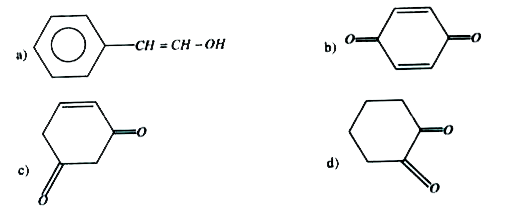Weak acids and bases are not completely ionised when dissolved in polar medium like water
H→H++A−
t0COOteqC−CαCαCα
Ka=Cα21−aplha=Cα2,α√KaC
∴α1α2=√Ka1Ka2,α1α2=√C2C1
( For two acids at same conc.) (for same acid at diff conc. )
Relative strength of two weak monoprotic acids may be given as Solution in Telugu
[H+][H+]2
α1α2
√Ka1Ka2
All of the above
The correct Answer is:D
Relative strength =[H+][H+]2=√Ka1√Ka2=α1α2
Topper's Solved these Questions
- BOOK - AAKASH SERIESCHAPTER - IONIC EQUILIBRIUM EXERCISE - LECTURE SHEET (EXERCISE -II LEVEL -II (ADVANCED) ( Matrix Matching Type Questions))2videos
IONIC EQUILIBRIUM
- BOOK - AAKASH SERIESCHAPTER - IONIC EQUILIBRIUM EXERCISE - LECTURE SHEET (EXERCISE -II LEVEL -II (ADVANCED) (Integer Type Questions))6videos
IONIC EQUILIBRIUM
- BOOK - AAKASH SERIESCHAPTER - IONIC EQUILIBRIUM EXERCISE - LECTURE SHEET (EXERCISE -II LEVEL -II (ADVANCED) (More than One correct answer Type Questions))4videos
IONIC EQUILIBRIUM
- BOOK - AAKASH SERIESCHAPTER - HYDROGEN AND ITS COMPOUNDSEXERCISE - QUESTIONS FOR DESCRIPTIVE ANSWERS20videos
HYDROGEN AND ITS COMPOUNDS
- BOOK - AAKASH SERIESCHAPTER - ISOMERISM EXERCISE - ADDITIONAL PRACTICE EXERCISE ( PRACTICE SHEET (ADVANCED) INTEGER TYPE QUESTIONS)10videos
ISOMERISM
Similar Questions
 04:31View Solution
04:31View SolutionCalculate the change in pH of water when 0.01 mole of NaOH are added in 10 litre water.
04:31View SolutionpH of a weakacid in 0.1 M solution is 4.3. Which statements are correct ?
04:31View SolutionWhy the use of hard water is disadvantages?
03:23View SolutionTautomerism is exhibited by X number of compounds among the following. What is X.
 View Solution
View SolutionThe degree of dissociation of weak electrolyde is inversely proportional to the square root fo concentration. It is called Ostwald's dilution law. alpha = sqrt((K_(a))/(c)) As the tempertaure increases, degree of dissociation will increase. (alpha_(1))/(alpha_(2)) = sqrt((K_(a_(1)))/(K_(a_(2)))) if concentration is same. (alpha_(1))/(alpha_(2)) = sqrt((c_(2))/(c_(1))) if acid is same. 0.01M CH_(3)COOH has 4.24% degree of dissociation, the degree of dissociation of 0.1M CH_(3)COOH will be
09:03View SolutionThe degree of dissociation of weak electrolyde is inversely proportional to the square root fo concentration. It is called Ostwald's dilution law. alpha = sqrt((K_(a))/(c)) As the tempertaure increases, degree of dissociation will increase. (alpha_(1))/(alpha_(2)) = sqrt((K_(a_(1)))/(K_(a_(2)))) if concentration is same. (alpha_(1))/(alpha_(2)) = sqrt((c_(2))/(c_(1))) if acid is same. pH of 0.005 M HCOOH [K_(a) = 2 xx 10^(-4)] is equal to
01:44View SolutionThe degree of dissociation of weak electrolyde is inversely proportional to the square root fo concentration. It is called Ostwald's dilution law. alpha = sqrt((K_(a))/(c)) As the tempertaure increases, degree of dissociation will increase. (alpha_(1))/(alpha_(2)) = sqrt((K_(a_(1)))/(K_(a_(2)))) if concentration is same. (alpha_(1))/(alpha_(2)) = sqrt((c_(2))/(c_(1))) if acid is same. a_(1) and a_(2) are in ratio of 1:2, K_(a_(1)) = 2xx10^(-4) . What will be K_(a_(2)) ?
02:28View SolutionObtain a general relationship between temperature coefficient of resistance α1 and α2 at temperature T1.∘C and T2.∘C for a given conductor.
01:38View SolutionIf concentration of two weak acids are C1 and C2mol/L and degree of ionization are α1 and α2 respectively then their relative strength can be compared by :
01:44View SolutionThe determination Δ=∣∣ ∣ ∣∣bcbα+ccdcα+dbα+ccα+daα3−cα∣∣ ∣ ∣∣ is equal to zero if
01:38View SolutionWeak acids and bases are not completely ionised when dissolved in polar medium like water
H→H++A−
t0COOteqC−CαCαCα
Ka=Cα21−α=Cα2,α√KaC
∴α1α2=√Ka1Ka2,α1α2=√C2C1
( For two acids at same conc.) (for same acid at diff conc. )
αand α are in the ratio 1:2 at same conc. Ka1,=2×10−4, what will be Ka2,?02:43View SolutionWeak acids and bases are not completely ionised when dissolved in polar medium like water
H→H++A−
t0COOteqC−CαCαCα
Ka=Cα21−α=Cα2,α√KaC
∴α1α2=√Ka1Ka2,α1α2=√C2C1
( For two acids at same conc.) (for same acid at diff conc. )
0.01M CH3,COOH is 4.24% ionised. What will be the pereentage ionisation of 0.1 MCH3,COOH.02:26View SolutionWeak acids and bases are not completely ionised when dissolved in polar medium like water
H→H++A−
t0COOteqC−CαCαCα
Ka=Cα21−aplha=Cα2,α√KaC
∴α1α2=√Ka1Ka2,α1α2=√C2C1
( For two acids at same conc.) (for same acid at diff conc. )
Relative strength of two weak monoprotic acids may be given as08:13View SolutionWeak acids and bases are not completely ionised when dissolved in polar medium like water
H→H++A−
t0COOteqC−CαCαCα
Ka=Cα21−α=Cα2,α√KaC
∴α1α2=√Ka1Ka2,α1α2=√C2C1
( For two acids at same conc.) (for same acid at diff conc. )
αand α are in the ratio 1:2 at same conc. Ka1,=2×10−4, what will be Ka2,?02:11View SolutionWeak acids and bases are not completely ionised when dissolved in polar medium like water
H→H++A−
t0COOteqC−CαCαCα
Ka=Cα21−aplha=Cα2,α√KaC
∴α1α2=√Ka1Ka2,α1α2=√C2C1
( For two acids at same conc.) (for same acid at diff conc. )
Relative strength of two weak monoprotic acids may be given as07:38View Solution

